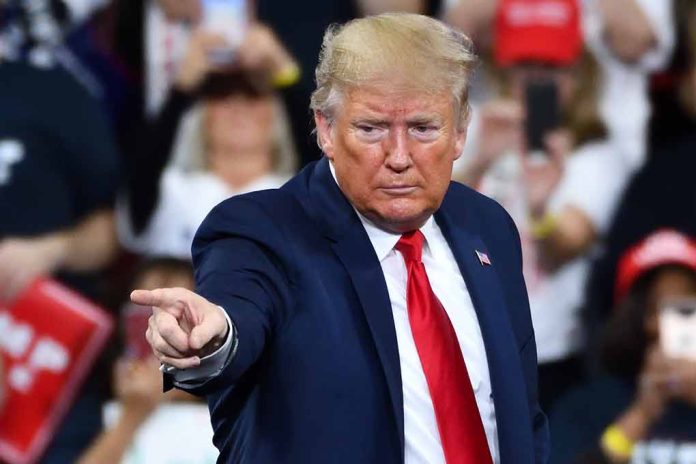
President Trump has declared a national emergency at the southern border, designating certain cartels and gangs as foreign terrorist organizations in a bold move to address illegal immigration and national security concerns.
Key Takeaways
- President Trump has declared a national emergency at the southern border, designating certain cartels and gangs as foreign terrorist organizations.
- The declaration allows for increased military involvement and new legal authorities to combat transnational criminal organizations.
- Tren de Aragua and MS-13 are among the groups to be designated as foreign terrorist organizations.
- Critics warn of potential international complications and escalated violence from cartels in response to the designation.
- The move enables the construction of additional physical barriers and deployment of armed forces to the border.
National Emergency Declaration and Terrorist Designations
In a significant shift in border policy, President Donald Trump has declared a national emergency at the southern border of the United States. This declaration comes with the additional step of designating certain drug cartels and gangs, including the Venezuela-based Tren de Aragua and El Salvador-based MS-13, as foreign terrorist organizations (FTOs). The move is aimed at addressing what the administration describes as an “invasion” causing chaos, suffering, and deaths in the U.S. over the past four years.
The national emergency declaration invokes sections of the National Emergencies Act and U.S. Code to authorize military involvement in border control efforts. The Secretary of Defense has been directed to deploy military personnel and resources to support these efforts, marking a significant escalation in the use of military assets for border security.
J/20th, 2021: Biden terminates the U.S. national border emergency declaration
J/20th, 2025: Trump signs a new one pic.twitter.com/nugk8DgxeX
— End Wokeness (@EndWokeness) January 21, 2025
New Authorities and Implications
The designation of certain groups as FTOs unlocks new authorities for dealing with migrants and transnational criminal organizations. This includes potential military action and enhanced surveillance capabilities. The Justice Department will now be able to pursue individuals suspected of providing “material support” to these designated groups, significantly expanding the legal reach of law enforcement agencies.
A new homeland security task force will be established to carry out related orders and actions within the U.S. The defense secretary will play a crucial role in determining the shape and scope of any military action, underlining the increased militarization of border security efforts.
Potential Risks and Criticisms
While supporters view these measures as necessary for national security, critics warn of potential complications. Some experts caution that designating cartels as terrorist organizations could lead to more brutal tactics by these groups and strain international relations, particularly with neighboring countries.
Additionally, past deployments of troops to the border have been criticized for lacking military training value and potentially affecting overall military readiness. With approximately 2,500 troops currently serving at the southern border under a previous authorization, the expanded deployment raises questions about the long-term impact on military effectiveness.
Implementation and Oversight
The proclamation outlines several key actions, including the construction of additional physical barriers along the southern border and consideration of waiving regulations to counter unmanned aerial systems near the border. Policies and strategies are to be revised to prioritize border security and the safety of personnel involved in these operations.
To ensure accountability, reporting requirements have been set for the Secretary of Defense and Homeland Security to update the President on actions taken and border conditions. The implementation of these measures is to be carried out in accordance with applicable laws and budgetary constraints, emphasizing the need for a structured and legally sound approach to this significant policy shift.
Sources:
Border declaration, terrorist designations unlock new options—and new risks
DECLARING A NATIONAL EMERGENCY AT THE SOUTHERN BORDER OF THE UNITED STATES



